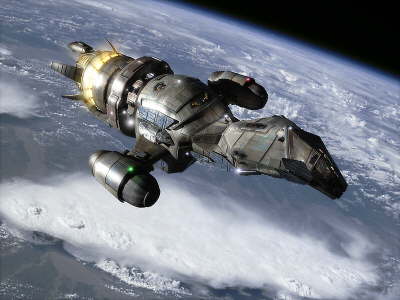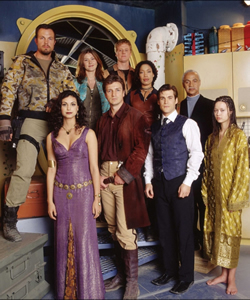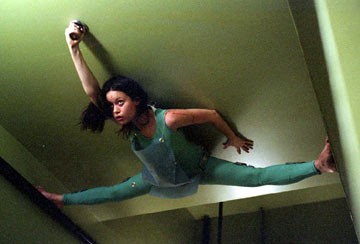This review is a month late. It’s also very, very long. So sue me.
INTRODUCTION
Joel and Aimee and many other geeks have written rave reviews for the recent sci-fi action flick Serenity. Most of these raves come from fans of the television show Firefly, upon which the film is based. I’ve never seen the show, but the film’s geek cred drew me to it. (To be fair, some geeks recognized the film as flawed, and knew that non-fans might feel overwhelmed.)

My short review: this is a good science fiction movie. My long review follows, but first a plot synopsis.
Sometime in the future, Earth has become overpopulated, forcing humanity to migrate (apparently in massive numbers) to another star system. This new star system is some sort of bizarre astronomical anomaly: it contains “dozens of planets and hundreds of moons”. The refugees terraform these planets and moons over the course of decades (centuries?). These worlds are centrally controlled by some sort of Alliance, which may or may not be an authoritarian government. (The political situation seems important, but is only vaguely described.) Life is complicated by the presence of rampaging zombie space pirates (seriously) that periodically raid remote settlements.
As the film begins, River, a young woman with psychic powers (and incredible physical prowess), is being held for experimentation by some top-secret government science organization. Her brother frees her and takes her to the spaceship on which he is the medical officer. This ship is called Serenity, and includes a crew of maybe a half dozen outlaws.
These outlaws travel to an outlying settlement in order to rob the payroll from somebody. (No, this doesn’t really make sense. It’s one of those film things that is more for effect than because it’s actually sensible. Why is the payroll not handled through electronic transactions, or at the very least through checks? I don’t know. It just isn’t. It’s paid in cash.) During the heist, the zombie space pirates attack, and our heroes flee.
Meanwhile, a dangerous government assassin has been dispatched to recover River, the stolen girl. (This assassin kills his marks in a bizarre fashion. He holds a sword on the ground and then causes his victims to fall upon it via some sort of acupressure. Again, this makes no sense, and is solely for effect.) Wherever our heroes go for refuge, the assassin follows, and he kills those who come into contact with the crew.
Eventually, Serenity makes its way to River’s home planet, where we learn that the government had been experimenting with some sort of air-borne pacification drug intended to keep the population malleable. (Sort of like the spores in that old Star Trek episode.) The drug didn’t just pacify, though, but sapped everyone’s will to live. People stopped caring. They died where they stood. (Again, this doesn’t really make sense. It doesn’t need to. It’s just a plot device.) Coincidentally, this same pacification drug caused a portion of the population to turn into the zombie space pirates that have been causing trouble.
Our heroes decide that the entire star system must know about this heinous crime (if crime it is), so they head for a technogeek guy they know. Unfortunately, the government assassin has anticipated this move, and a three-way final battle ensues (heroes vs. government vs. zombie space pirates). In the end, the heroes win, but not without cost.
It’s all rather fun while it lasts, despite the improbabilities, but the film hasn’t held up well over the ten days since I viewed it. Most of what I have to say is negative. As you read the following, realize that I enjoyed the film, and would probably grade it a B.
CHARACTERS
There are many characters in Serenity, but they’re mostly uninteresting. I felt no connection with any of them except River, on whom the film devotes the most time for backstory. River is a fantastic character — and the film is all about her — but truth be told, she’s not used enough. She’s less a character than a convenient re-usable deus ex machina, and a pretty figure to pose in comic book stances. (And she is a pretty figure. Is there anything sexier than a fit young woman, barefoot, clad in only a thin gauzy dress, laying waste with mad martial arts skills? No, there is nothing sexier.) I’d like to know more about Kayleigh, and the captain, and some of the minor players, but I’m never given the chance. (One character seems completely superfluous. Ariana (or whatever her name is) serves no purpose. It’s my guess that she’s in the film simply to tie up some loose plot thread from the television series. She was apparently once the captain’s girlfriend.)
Furthermore, the characters are not complex. Each is defined by a single motive. Kayleigh loves the doctor. The doctor is protective of River. River is a psychic killing machine. (People keep saying she’s mentally disturbed or crazy, but we have no evidence of this other than the fact that people keep saying it is so.) Some characters have no motives: the pilot and his wife, what’s their deal? Who knows. The lumox is a lumox. The captain’s motive is one-liners.
As a sidenote: River looks a little like Fiona Apple, don’t you think?
Musical Waif Ass-Kicking Waif Captain Malcolm looks like Nate Fisher from Six Feet Under or like Craig Briscoe from Alaska.
Architect Undertaker Outlaw
DIALOGUE
Speaking of one-liners…
Though writer-director Joss Whedon‘s plotting is strong, and his dialogue is brisk, he has peppered the script with the twee smart-alecky humor that I so dislike in his writing. (Whedon is the man behind the Buffy the Vampire Slayer franchise, and is currently writing one of the many flavors of X-Men, the only flavor that interests me.) I’ll wager his fans love the one-liners. I do not. They’re not funny. His character’s snappy, “witty” retorts don’t make me laugh; they make me grimace. The most egregious of these witticisms are reserved for the beginning of the film, during the character development moments. I can’t help but think that if Whedon had spent more time on character development than on jokes, maybe the audience would care more about the characters.
I was worried that the entire film would be filled with one-liners, but fortunately they subside, and some are eventually quite funny.
Here’s an example of an exchange I like. During the climactic battle scene, as he is about to kill the captain, the government assassin asks, “Do you know what your sin is?” The captain replies, “Hell, I’m a fan of all seven, but right now I’m going to have to go with wrath.” A bit stagey and far too wordy, but amusing. (And, yes, I realize that line sounds as if it might be spoken by Sawyer from Lost.)
Here’s an example of a more typical “funny” line. After a drawn-out chase on a landspeeder of sorts, River says, “I swallowed a bug.” Ha ha! Later, the captain says, “Doctor, I’ve taken your sister under my protection here. If anything happens to her, anything at all, I swear to you: I will get very choked up. Honestly. There might even be tears.” If you find this sort of banter witty, then you may love the film. If you find this dialogue forced and, well, dumb, then there are parts of this film that must be endured rather than enjoyed. (You can read more quotes here.)
I do like the conceit that these characters speak in American Civil War-era English. It gives the setting a sense of foreign-ness while still being accessible. (Plus, I love American Civil War-era English.)

STORY
I like the “Born in a Trunk“-style (or Matrix-style, if you prefer) onion-peeling levels of unreality that start the film. (You can watch the first nine minutes of the film here.) A voiceover history of the story’s setting turns into a school lecture turns into a memory turns into a holographic projection. (I may even have missed a layer.) This history lesson does a fair job of introducing the setting without being too clumsily obvious an exposition dump, but it doesn’t succeed entirely. I want to know more about this bizarre solar system. Why does it have “dozens of planets and hundreds of moons”? How does that work? Why were so many able to be terraformed? Just how large is the habitable zone around this star? Aren’t most of the planets far too cold or far too hot for terraforming ever to work? Tell me more!
There are certain sections of the film where I felt a little lost. At one point, our heroes flee to a sort of religious commune in a desert. Why? There seems to be some sort of shared history there, but the audience is never made to understand what sort of shared history that might be. And later, when the commune is massacred, we’re supposed to care, but we don’t.
Other things bother me, too. The post-heist action sequence is lame, especially the whole “we can’t pick up another guy because he’d be too heavy” bit. We’re told River weighs ninety pounds. Surely the landspeeder thingie can hold River and a medium-sized guy just as well as it could hold a jumbo-sized guy, right? Why does the number of people matter? Wouldn’t mass be the limiting factor?
Also: Not only is the character Ariana superfluous, she’s responsible for one of the most ludicrous scenes in the film. She’s a priestess. She apparently once had a relationship with the captain, so the bad guys use her as bait to draw our heroes to them. While under the watch of the government assassin, she’s able to obtain some sort of gunpowder-based bomb, plant it before her Buddha, and then use an incense stick to cause it to go off at exactly the right moment to prevent the captain from being killed. Huh? This is one of the most improbable things I’ve ever seen in a film.
EFFECTS, ETC.
I liked the design of this film. The feel of the society is unique and interesting: a sort of combination between the Wild West and modern SE Asia. The setting sometimes feels like Blade Runner, but less industrial.
The space battles are similar (but slightly superior) to the opening sequence in Revenge of the Sith. They also share some of the same flaws. There are too many ships, there’s too much going on, and the camera shots are too tight for the audience to have any idea of what is actually happening. It’s just frenetic chaos, and that’s not fun to watch. It’s as if the plot shuts down for two minutes and you have to tell yourself: “This is a generic space battle; nothing about it matters.”
Another (bad) similarity to Star Wars: remember how absurd it was in The Phantom Menace that the Trade Federation could blockade a planet by forming a ring around its equator? Well, the same goofiness is present in Serenity. Twice. Those who write science fiction films need to be taught to think in three dimensional space. (It was even a major plot point during the final battle in Strar Trek II: The Wrath of Kahn, but in that film, the writers used this knowledge to their advantage.)
Too many things in this film occur just for the effect. (Remember this was one of my complaints with Peter Jackson’s Tolkien grotesques.) In the first few minutes, River climbs a wall and braces herself on the ceiling in order to escape detection, an act that seems wholly gratuitous.

Why not just hide behind a cart of medical supplies? Because that wouldn’t look cool! Near the end of the film, River (who, remember, is a one-woman killing machine) goes apeshit on a horde of zombie space pirates that is attacking Serenity. Most of her rampage occurs off-screen. When it’s finished, the camera pulls back to reveal River, surrounded by zombie space pirate corpses, holding two massive axe-like weapons (both of which are dripping copious amounts of blood). She looks like a waif-orc. It’s meant to be cool, but it’s actually funny in a sort of ludicrous way.
As a director, Whedon shoots with fine dramatic effect, often employing what I consider comic book shots: he shoots from unusual angles or perspectives (overhead shots, ground-level shots), uses atmospheric lighting, and loves to stand his actors in super-hero poses.
The soundtrack was good: varied and interesting. It wasn’t omnipresent (as John Williams’ recent overblown Star Wars scores), but when it was there, it was fun.
CONCLUSION
Serenity is the sort of film that, upon reflection, doesn’t hold up well. There are just too many gaps of logic, and too much is done for effect rather than for the service of the story. And yet I liked it. I liked the film despite its sophomoric humor, its superfluous characters, its strange science. It has a charm and likeabiltiy about it that are missing in the recent Star Wars films, for example.
Is this the best science fiction film of the 21st century? I don’t think it even comes close, not even with qualifications. Did it deserve to bomb at the box office? Probably not. Why did it bomb at the box office? I can think of two reasons. First, the trailer was terrible. The day before I saw Serenity, I watched a preview for it in the theater that almost made me decide against it. Second, it’s just not one of those films that makes you want to run out and recommend it to other people. I have many geek friends who are also unfamiliar with this universe and story, but I don’t intend to proselytize to them.






I didn’t care much for Firefly, and bailed on it fairly quickly. I missed several of what are considered the better episodes, but really the show had almost nothing going for it: The background and setting was silly (at best), the characters were almost-to-a-man unlikeable (the exception was Simon, the doctor, who was the only one on the ship with either ethics or sense; although I give River a pass), the stories were boring, and I’m completely with you on the dialogue.
I skipped Serenity altogether.
What you think of as “comic book shots” I think of as “classic cinematography”. Hitchcock, especially, employed notable camera angles all the time! One of the (many) things that bugged me about Star Trek: The Next Generation was its very pedestrian direction – very different from the visually intriguing camerawork in the original Star Trek.
Many of my friends are ga-ga over Buffy the Vampire Slayer, which I have never watched (since by the time it registered on my consciousness I didn’t have the energy to play catch-up on it). So I watched Firefly to see what all the Joss Whedon hubbub was about. (Obviously, I didn’t get it.)
I haven’t read his X-Men series, but more from X-Men fatigue than a dislike of Whedon. Overall, though, I see Whedon as a somewhat-more-successful version of J. Michael Straczynski, and with some of the same flaws (notably his dialogue; I cringed at the dialogue in the Serenity trailers).
I was curious to see whether all the buzz about Serenity was just fan buzz, or if it had crossed into the mainstream. Babylon 5 never quite made it into the mainstream (despite being the best SF TV series ever), and it looks like Serenity didn’t either.
I didn’t watch Firefly, but I am a big BtVS fan. I can certainly see how the Buffyverse would not work well in a movie. In a series situation, you really begin to know and care about the characters and learn to appreciate and even expect the snappy retorts. The amusing dialog and humorous references were what really drew me to the series, not a love of monster/fantasy genre. Typing this makes me miss the show – maybe I’ll get out the DVDs and have a Buffy Halloween!
Well, okay, I can see where you’re coming from… with a lot of what you have to say.
But still, what sci fi film in the last five years is better?
I realize now (rather belatedly) that most of the point of my whole “Serenity is the best sci-fi movie of the 21st century” thing was to point out how weak the recent sci-fi movies have been. Well, this was my point when I started writing, but looking back I realize I failed to actually state it. (This happens to me all the time, and is one of the drawbacks of the instantaneous publishing that weblogging allows. Easily fixed, I suppose, with a little discipline.) Yep, “Serenity” had a lot of problems, most of which were ameliorated by my familiarity with and affection for the tv-show, but I’m glad you enjoyed it enough to give it a B, which isn’t a bad grade coming from you.
Joel: I realize now (rather belatedly) that most of the point of my whole “Serenity is the best sci-fi movie of the 21st century” thing was to point out how weak the recent sci-fi movies have been.
I agree 100%. In a paragraph that was edited from my final post, I lamented how we’ve not had a truly great science fiction film in many years. (Though I didn’t bother to try to remember the last one. That would be an interesting task. Jurassic Park? No, I suppose it’s The Matrix.)
Recent sci-fi films I think are better than Serenity include: the Spielberg/Cruise collaborations Minority Report and War of the Worlds. That’s it. And those two aren’t great. I don’t even fell compelled to own them on DVD. Films I think equal to Serenity include: Donnie Darko and Fellowship of the Ring (but not the two abominations which followed it — and, yes, I know FotR is fantasy),
I liked Serenity. I did. I just wanted to like it more.
I agree with Mr. Rawdon that key characters are unlikable. The Captain? He’s an ass. His only mode is conflict. Same with the lumox. I liked Kayleigh well enough, and might have liked Simon if he weren’t so one-dimensional. As it is, River was the only great character.
I watched the pilot episode yesterday and half of the second before giving up. At least some questions regarding characters are answered there. I see now where Shepherd Book came from and why he knows the group and why we’re supposed to care when he dies. I see Irina (or whatever her name is) has something of a past with the group, though it wasn’t explained before I gave up and mailed the disc back to Netflix. (It wasn’t bad, but I just don’t have time to spend on something like this right now.) Most interesting is that River looks like she’s just a teenage girl with no psychic powers and no sexy martial-arts moves. Out of everything, that most intrigues me: how did she get from point A to point B? Maybe I’ll read an episode guide.
Michael: What you think of as “comic book shots” I think of as “classic cinematography”.
I’ve not been clear. There are two different things I’m talking about here. I haven’t seen as many old films as Michael, but I’ve seen plenty. I think Whedon has a great eye, and uses some fine innovative and classic shots, but he also likes what I consider comic-book shots: shots that would look “cool” (note quotes) in a comic book. The “River standing in shadows with dripping axes” is a classic example. The photo I’ve posted above of River hanging from the ceiling is another.
(Last night as I was trying to fall asleep, I was thinking about how ludicrous this scene is. What a dumb place to hide. When you’re walking down an institutional hallway, what are you more likely to notice? Somebody hanging from the roof or somebody hidden behind a cart? You’re going to notice the person hanging from the roof!)
I’m tempted to go into a whole television sci-fi thing here, comparing the strengths and weaknesses of ST:TNG, Babylon 5, Firefly, Farscape, and the new Battlestar, but that’s fodder for another entry…